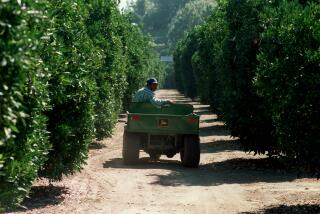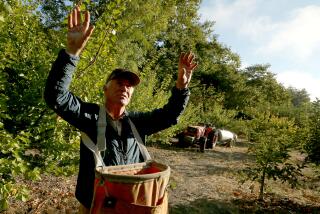San Juan Buys Kinoshita Farm for $9.5 Million : Preservation: Much of the property, which includes a 112-year-old farmhouse, will continue to be farmed as reminder of a vanishing way of life.
- Share via
SAN JUAN CAPISTRANO — A 56-acre farm, smack in the middle of a densely populated residential area, was bought by the city Tuesday for $9.5 million to be preserved as a sort of living museum.
In an unprecedented arrangement, the City Council voted to buy the Kinoshita farm and to go into the farming business in an attempt to preserve part of the Capistrano Valley’s quickly disappearing heritage.
The farm, which includes a 112-year-old farmhouse, was chosen because it is next to an elementary school and junior high and surrounded by one of the city’s most heavily populated neighborhoods, Mayor Gary L. Hausdorfer said.
“Schoolchildren can look out their windows and see the abundant farmland, the corn growing, the smell of the strawberries, and so can those of us driving by,” Hausdorfer said. “There’s something healthy about that for the city, and, frankly, for all of Orange County.”
Hausdorfer called the purchase a “historic achievement.” The farm, with its corn, lettuce and strawberry crops, “represents the lifestyle that at one time existed all over the valley,” Hausdorfer said. “That makes it not only a pleasant aesthetic for the community, but also a reminder of a more rural past.”
Shig and Bobby Kinoshita, members of the family that has owned and farmed the land for 35 years, will continue to manage its operations, according to the agreement. All but 10 acres of the current farm will remain active farmland.
Shig Kinoshita, 56, said Tuesday that his family had mixed emotions.
“I’m happy and sad, kind of a balance between the two,” he said. “I’m sad because the farm has been in our family so long. But I’m happy that we’re leaving a legacy that will always be a farm and referred to as the Kinoshita farm. It would crush me if I sold it and the next day it was being turned into houses. That would hurt.”
Because of its central location, next to Del Obispo School and Marco Forster Junior High School, its flat terrain and its existing utilities, the Kinoshita farm has been a prime target for development.
“Look at it, it’s one of the most easily developed pieces of property left in the city,” Hausdorfer said. “That’s one of the reasons this is such a significant achievement.”
Saving its agricultural heritage has been a priority in San Juan Capistrano since 1976, when about 200 acres in the city were zoned as agricultural preserve, including the Kinoshita property. The zoning set limits on what could be developed there and reduced its market value. The Kinoshitas, who knew someday they would sell their land, have battled that zoning ever since.
Shig Kinoshita said the city’s plan to buy his land and maintain it as a farm represents a good compromise.
Under the agreement, the Kinoshitas, who live in Orange County, will receive $1 million at the close of escrow, expected to be about Feb. 1, and payments thereafter for 20 years, City Manager Stephen B. Julian said.
The remaining 10 acres of the Kinoshita property not slated to remain farmland will be reserved as a potential site for an adult education program, Julian said.
To buy the land, the city will use a $1.3-million loan from the California Coastal Conservancy that, with the help of state Sen. Marian Bergeson (R-Newport Beach), could at some time become a grant, Julian said. State Coastal Conservancy funds are available for purchases of property that will remain farmland.
The city will also spend $6 million of $21 million in bonds approved by voters as Measure D last April. The remainder of the money for the purchase will come from the city’s agricultural preserve funds and park fee funds, Julian said.
The city in April identified 140 acres of land it hoped to buy to preserve as farmland or parks.
The city initially planned to buy only 20 acres of the Kinoshita farm, but when all of the Kinoshita property became available, the city opted to buy it all, Hausdorfer said.
“The reason we care so much about Shig’s property is that it represents the only actively farmed property in the city,” Hausdorfer said. “It’s so visible, lying right in the heart of the city.”
The rest of the bond money will be used later to buy about 120 acres of privately owned orange groves in the northern parts of the city, Julian said.
Tuesday’s agreement “really puts us on a new course,” Julian said. “We’re going into the farm managing business.”
More to Read
Sign up for Essential California
The most important California stories and recommendations in your inbox every morning.
You may occasionally receive promotional content from the Los Angeles Times.













